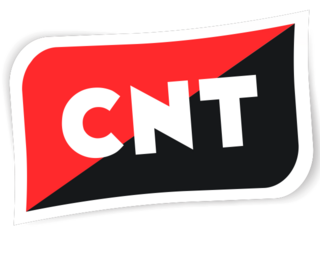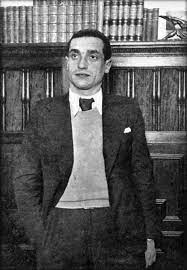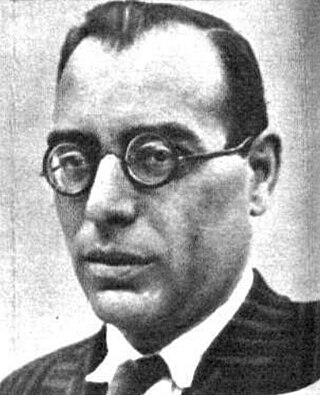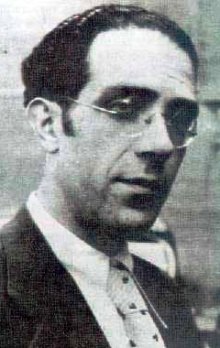The May Days,sometimes also called May Events,were a series of clashes between 3 and 8 May 1937 during which factions on the Republican side of the Spanish Civil War engaged one another in street battles in various parts of Catalonia,centered on the city of Barcelona.

Revolutionary Catalonia was the period in which the autonomous region of Catalonia in northeast Spain was controlled or largely influenced by various anarchist,communist,and socialist trade unions,parties,and militias of the Spanish Civil War era. Although the constitutional Catalan institution of self-government,the Generalitat of Catalonia,remained in power and even took control of most of the competences of the Spanish central government in its territory,the trade unions were de facto in command of most of the economy and military forces,which includes the Confederación Nacional del Trabajo which was the dominant labor union at the time and the closely associated Federación Anarquista Ibérica. The Unión General de Trabajadores,the POUM and the Unified Socialist Party of Catalonia were also prominent.

The Confederación Nacional del Trabajo (CNT) is a Spanish anarcho-syndicalist trade union confederation.

Joan Peirói Belis was a Catalan anarchist activist,writer,editor of the anarchist newspaper Solidaridad Obrera,two-time General Secretary of the Confederación Nacional del Trabajo and Minister of Industry of the Spanish government during the Spanish Civil War.

Joaquín Ascaso Budría was an Aragonese anarcho-syndicalist and President of the Regional Defence Council of Aragon between 1936 and 1937.
Eusebio Rodríguez Salas was a Spaniard known for being the Commissar-General of the police forces of Catalonia who played a central role in the ignition of the Barcelona May Days.

The July 1936 military uprising in Barcelona was a mutiny that occurred in Barcelona,the capital and largest city of Catalonia,in the Second Spanish Republic from 19 to 21 July 1936. It was one of the main events that marked the start of the Spanish Civil War.

Joan Comorera i Soler was a Spanish Communist politician,journalist and writer from Catalonia who spent several years in Argentina before returning to Spain in 1931 at the start of the Second Spanish Republic. He was a Catalan nationalist,and was elected chairman of the Socialist Union of Catalonia in 1933. In 1936 he became Secretary General of the Unified Socialist Party of Catalonia (PSUC),in alliance with the Spanish Communist Party. During the Spanish Civil War (1936–1939) he built up his party into a major political force during the struggles among the supporters of the Republic between Socialists,Stalinists,Trotskyists and Anarcho-syndicalists. After the Republicans were defeated by the right-wing forces led by Francisco Franco he went into exile,living in Mexico and then in France. In 1949 he was expelled from the Communist party for his Catalan nationalism,and survived an assassination attempt. In 1951 he moved back to Catalonia using a false name. He was arrested in 1954 and died in prison four years later.

Jesús Hernández Tomás was a Spanish communist leader. During the Spanish Civil War (1936–1939) he was Minister of Education and Fine Arts,then Minister of Education and Health. After the war he went into exile in Oran,Moscow and then Mexico. He was expelled from the party in 1944 for disloyalty to the leadership,and purged from the official history of the party after writing a book in 1953 critical of the Stalinist role in the Civil War.

Vicente Uribe Galdeano was a Spanish metalworker and politician who became a member of the executive of the Communist Party of Spain (PCE). He served as Minister of Agriculture during the Spanish Civil War (1936–1939) for the Republican faction. He went into exile in Mexico during World War II (1939–1945),then lived in France and Czechoslovakia after the war. He was disgraced in 1956 during the post-Stalinist power struggle.

Rafael Vidiella Franch was a trade unionist and communist politician from Catalonia. He served as a minister in the government of Catalonia during the Spanish Civil War (1936–1939).

Juan López Sánchez was a Spanish construction worker,anarchist and member of the Confederación Nacional del Trabajo,and one of the founders of the Federación Sindicalista Libertaria. During the Spanish Civil War (1936–1939) he was Minister of Commerce under Francisco Largo Caballero. After the war he spent several years in exile before returning to Spain where he lived without persecution and participated in the "vertical" trade union movement authorized by the dictatorship of General Francisco Franco.
Women in the Federación Anarquista Ibérica were often only addressed because of what they appeared to be able to offer male FAI leadership in terms of attracting adept fighters and politicians.
Germinal de Sousa was a Portuguese anarchist and secretary of the Iberian Anarchist Federation's Peninsular Committee. He oversaw the FAI's collaboration with the government of the Spanish Republic up until late 1938,when he broke with the leadership of the CNT over the matter.

The Central Committee of Antifascist Militias of Catalonia was an administrative body created on 21 July 1936 by the president of the Government of Catalonia,Lluís Companys,under pressure by the anarcho-syndicalists of the National Confederation of Labor (CNT) and Iberian Anarchist Federation (FAI),which led the workers' struggle against the July 1936 military uprising in Barcelona.
Ramón Álvarez Palomo was an Asturian anarcho-syndicalist and one of the key figures in the Revolution of 1934 and the establishment of the General Confederation of Labor.
Josep Juan i Domènech was a Catalan anarcho-syndicalist.

Mariano Rodríguez Vázquez,popularly known by his nickname Marianet,was a Spanish anarcho-syndicalist politician who served as General Secretary of the Confederación Nacional del Trabajo (CNT) during the Spanish Civil War.

Francesc Arín i Simó (1891–1936) was a Valencian trade unionist and journalist. A metalworker by trade,Arín became a union leader in the Confederación Nacional del Trabajo (CNT),within which he formed part of the moderate faction. He led the metalworkers' union through the early 1920s,which saw him arrested,exiled and blacklisted. He then switched professions to work in the fishing industry,within which he likewise became a trade union leader. During the dictatorship of Primo de Rivera,he joined the Solidaridad group led by Ángel Pestaña and continued to organise the CNT throughout the period.












